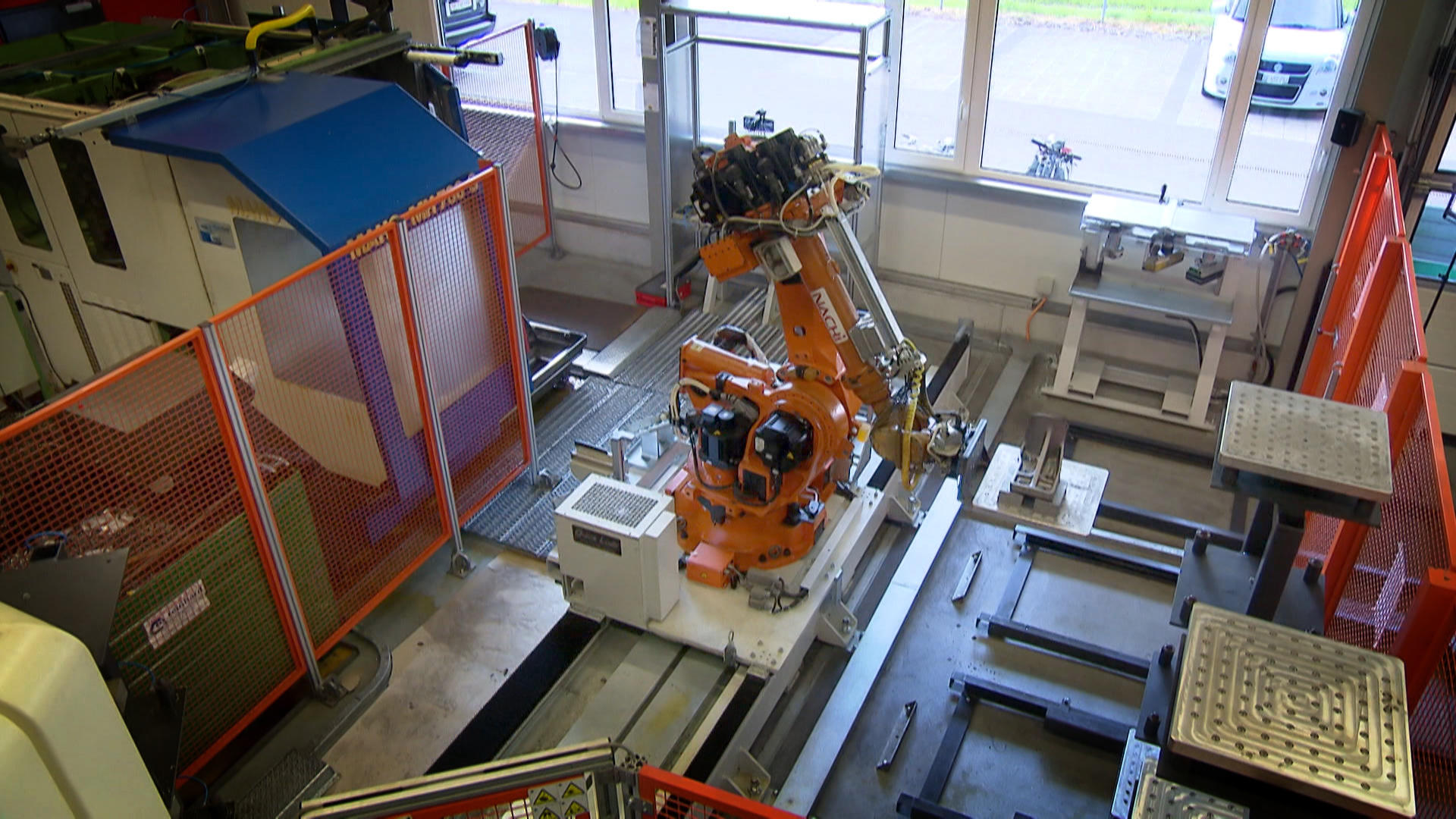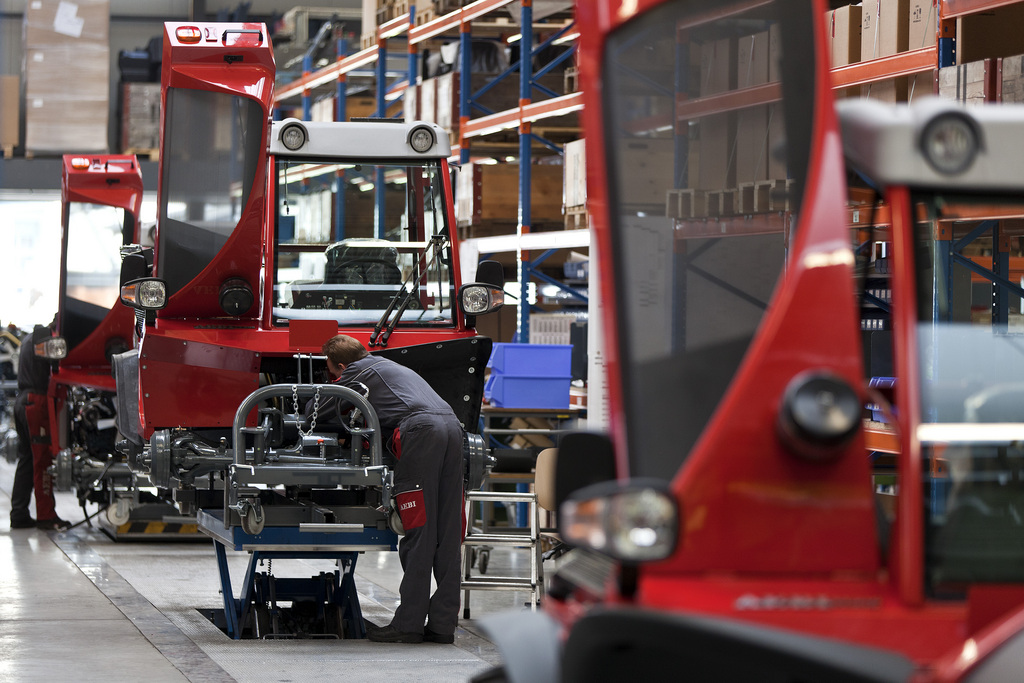Robots promise cure for Swiss manufacturing blues

It is hoped that robots can stem, or even reverse creeping deindustrialisation. An automated future is already becoming a reality in Switzerland.
Squeezed by the strong franc some Swiss firms have been moving production to cheaper countries since currency imbalances have made Swiss exports uncompetitive in many markets, particularly Europe. This was sharpened by the Swiss National Bank’s decision in January 2015 to abandon its defence of the franc.
The last great hope of Swiss-based industry appears to lie in the latest technological innovations, which can stem the exodus of factories: Robots that can work alongside humans, sensors that can detect potential defects in the production line and intelligent software that harmonise all the working parts – from construction and assembly to logistics and ordering new materials.
The transformation of the factory promises to reduce costs and enhance efficiency, acting as an antidote against rising manufacturing costs in Switzerland.
Swiss-Swedish technology giant ABB, which provides such equipment, has found strong demand in Switzerland. Marc-André Zingg, head of ABB Switzerland’s robotics division, is predicting a record year of sales.
YuMi the cobot
Last year, ABB unveiled YuMi, which the Swiss-Swedish company billed as the “world’s first truly collaborative robot”. Such ‘Cobots’ not only increase production line efficiency, but improve health and safety by relieving workers of manual labour tasks that can lead to repetitive movement injuries, according to Zingg.
He is also convinced that the innovation will prove financially attractive to smaller companies as it does away with the need to construct expensive cages around robots to separate them from human staff. In addition, they are better able to perform multiple tasks than traditional robots.
Automation is already helping bring some manufacturing back to the country, Zingg says. “Most of the manufacturing that has moved out of Switzerland has been relatively simple bulk production. But we are seeing more complex production returning, such as to the watch making industry.”
New ‘Made in Switzerland’ legislation that will from next year place more stringent conditions on goods bearing that label, may also be a factor in keeping Swiss manufacturing from moving abroad. There will also be a shift to more complex manufacturing in Switzerland, ABB’s robotics division head believes.
Salvation
Smaller Swiss manufacturing firm Paro, which builds custom-made automated production line systems, has found salvation in Switzerland rather than in far-flung markets.
“When the Swiss National Bank ended its defence of the franc [in January 2015], and the euro went down the drain, we were drowning,” Chairman Martin Frauenfelder told swissinfo.ch. Priced out its mainstay European market, Paro took the radical decision to concentrate on the small Swiss market.
Its advantage was being close to customers that require constant contact to build their tailor-made solutions. Demand for automated systems is also so high that European competitors have put up their prices, eroding the currency advantages they hold over Swiss firms, according to Frauenfelder.
“Things have gone much better that I had dared to think,” said Frauenfelder. Big orders came in from Nespresso, manufacturing heavyweight Georg Fischer and radiator maker Zehnder – and they are not the only Swiss firms updating their production lines.

More
Manufacturing opportunities with robots
The automation trend has come not a moment too soon for the Swiss industrial landscape – and for jobs.
A study by Lausanne’s Federal Institute of Technology (EPFL) this year found big exporters focusing more of their investments abroad since the central bank’s momentous decision. Some foreign investment is motivated by a desire to open facilities closer to customers, but the researchers concluded that some firms are escaping the high cost of producing goods in Switzerland.
Manufacturing lobby group Swissmem has also seen the danger. “Expansion is taking place almost exclusively abroad,” said its president, Hans Hess, at a recent press conference.
Since 1991, the number of people working in manufacturing in Switzerland has fallen from 790,000 to 630,000. Swissmem says that its member companies have lost 9,000 jobs since January 2015.
“Industry 4.0 can help compensate for higher wages in Switzerland and the strong franc,” Hansjörg Schmid, a spokesman for the Swiss Employees Association (Angestellte Schweiz), told swissinfo.ch. “3D printing, for example, has the potential to bring jobs back.”
“Switzerland, with its highly skilled workforce and excellent research and educational facilities, is one of the best equipped countries to deal with such demanding technology.”
While many traditional, labour intensive jobs may be lost to robots, Schmid is hopeful that the latest technology can create new employment in other areas, such as programming and machine servicing. “There are far more possibilities than dangers for the workforce,” he said.

In compliance with the JTI standards
More: SWI swissinfo.ch certified by the Journalism Trust Initiative












You can find an overview of ongoing debates with our journalists here . Please join us!
If you want to start a conversation about a topic raised in this article or want to report factual errors, email us at english@swissinfo.ch.